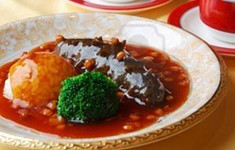 cently seen as going out of fashion, the processing industry is making a comeback in China. A decline in demand for luxury seafood in the country — caused by a clamp down on official waste and corruption — has dampened the outlook for one of China’s leading aquaculture and processor players.
cently seen as going out of fashion, the processing industry is making a comeback in China. A decline in demand for luxury seafood in the country — caused by a clamp down on official waste and corruption — has dampened the outlook for one of China’s leading aquaculture and processor players.Shandong Homey Aquatic Development Co., in its first quarter 2013 results, reported revenues of CNY 190 million (USD 30.9 million, EUR 24 million), up 0.96 percent year-over-year, with net profits at CNY 26.16 million (USD 4.3 million, EUR 3.3 million), up 4.52 percent compared to the same period last year.
With its share price slipping from CNY 6.26 (USD 1, EUR 0.79) to CNY 6.14 (USD 0.99, EUR 0.77) this week on worries over Beijing’s clamp down on government banqueting, Homey noted that while sales of sea cucumber were “quite low,” the company’s exports of processed aquatic foods had improved.
A gloomy outlook for sea cucumber sales has put questions over Homey plans to issue CNY 1 billion (USD 162 million, EUR 127 million) in bonds (of which CNY 400 million will be spent on new sea cucumber cultivation facilities). Likewise, the firm has spent heavily on marketing in the past year to drive sea cucumber sales, even moving its marketing base from Shandong to Beijing in order to oversee almost two dozen retail outlets opened in the last year to directly market Homey products. The firm will be anxious given the key fishing time of sea cucumber is around May, and the sales of sea cucumber in 2013 will be about 3,500 tons.
Local media reports in Heze city in Homey’s home base of Shandong province show the dilemma is faced by other firms like Homey. Sea cucumber sales are down 30 percent compared to the same period last year while prices are down 10 percent according to China media reports. High-end hotels are reducing their stocks of luxury seafood but also, in order to stimulate customer consumption, prices have dropped 50 percent.
Homey’s 2012 annual report showed revenue of CNY 1.028 billion (USD 167 million, EUR 130 million), increased 16.78 percent year-over-year, the net profit was CNY 216 million (USD 35 million, EUR 27 million), up 4.44 percent year-over-year. The attraction of high-margin luxury products like sea cucumber is obvious for firms like Homey. Demand for sea cucumber, which has emerged as a high-end gift item also contributed a big chunk of earnings at Dalian Yiqiao. Income from sea cucumber contributed CNY 200 million (USD 32.5 million, EUR 25 million) to Yiqiao revenues of CNY 372 million (USD 60.5 million, EUR 47 million) in 2012 — up 78.62 percent year-over-year, with net profit at CNY 161 million (USD 26 million, EUR 20 million), up 60.42 percent year-over-year. Sales of 1,113 tons of sea cucumber rose 220.77 percent year-over-year according to Yiqiao’s 2012 results.
While Yiqiao reported gross profit on sea cucumber in 2012 was 43.0 percent, sea cucumber prices are currently in a trough and facing an uncertain future as long as the central government pursues its austerity policy. According to the statistics published by the agriculture ministry, in 2012 national sales of sea cucumber at 170,800 tons climbed 24.01 percent year-over-year. The predicted production of sea cucumber in 2016 is 200,000 tons.
It may be that during the current climate of austerity Homey will refocus on its other business lines, among them processing. The company has also entered into the cold chain logistics business. For now however, investors however will be looking warily at the firm’s exposure to the luxury seafood market. Homey has been ramping up sea cucumber output: in 2010, the firm claims it captured or bred approximately 1,354 tons of sea cucumbers. In 2011 that figure rose to 2,282.7 tons of sea cucumbers while in 2012 the sea cucumber figure reached 2,928 tons.





